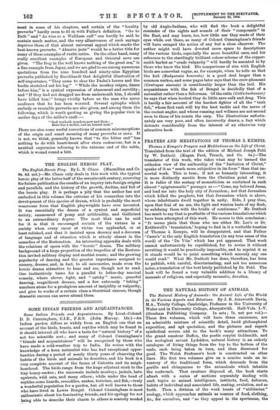THE ENGLISH HEROIC PLAY.
The English Heroic Play. By L. N. Chase. (Macmillan and Co. 8s. 6d. net.)—Mr. Chase only deals in this work with the typical heroic play of the latter half of the seventeenth century, reserving for future publication the results of an inquiry into foreign origins and parallels, and the history of the growth, decline, and fall of the heroic play. It is perhaps a pity that the author has not embodied in this volume the outcome of his researches into the development of this species of drama, which is probably the most wearisome form that English playwrights have ever invented. It was essentially the drams of a cynical and superficial society, enamoured of pomp and artificiality, and Gallicisel to an extraordinary degree. The most that can be said for it is that it encouraged certain of the virtues in a society when every sneer at virtue was applauded, or at least relished, and that it insisted upon decency and a decorum of language and of situation which is utterly absent in the comedies of the Restoration. An interesting appendix deals with the relations of opera with the " heroic " drama. The military background of a large proportion of the tragedies of the Restora- tion invited military display and martial music; and the growing popularity of dancing and the greater importance assigned to scenery, dresses, and, in fact, to all accessories, made even the heroic drama attractive to hear and see, though not to read. One instinctively turns for a parallel to latter-day musical comedy, where clever, light, and " catchy " music, graceful dancing, magnificent dresses, and a few extremely "taking" numbers atone for a prodigious amount of insipidity or vulgarity, and give to works of a certain class a theatrical success, though dramatic success can never attend them.






















































 Previous page
Previous page